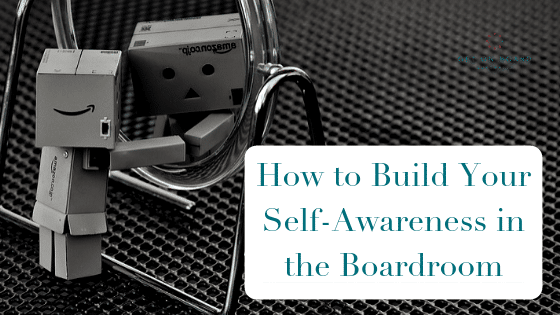How to Build Your Self-Awareness in the Boardroom

The more time I spend in the boardroom, the more obvious it becomes about what separates a good leader from a great leader.
That thing is self-awareness.
What else I have noticed is that very few people are consciously aware of who they are; what their values are, their beliefs, their personal preferences and tendencies, and how these play out through their behaviours and how they talk to others. Collectively this is called self-awareness.
Low self-awareness shows through behaviours such as letting your emotions control your actions (for example, overreacting to minor events), not having empathy (e.g. saying something that is offensive or upsetting to another person), and struggling to reach desired outcomes (e.g. no one is backing your ideas or suggestions).
On the other hand, high self-awareness allows you to identify your self-defeating actions, recognise the effect of what you say and your tone of voice has on others, know your areas of strength and areas for improvement, and understand how best to motivate and inspire others.
If you feel that you don’t have self-awareness, you can take steps to start building it. As a side note, if you think you don’t have self-awareness, you are actually probably starting to develop it.
Building Your Self-Awareness
Here are some ways in which you can build self-awareness for the boardroom:
• Take psychometric tests (or personality tests): These include tests such as Myers-Briggs, Predictive Index, and E.A.T. All are aimed as serving as a data point towards greater self-awareness through making you select an answer from trade-off questions to help you better understand your own true character. These are great for boards to do as a team to understand others’ personalities and temperaments, and how you can work better as a group.¹
• Ask for feedback from a trusted friend or advisor: Find someone you know who sees in action in a leadership position and will be very candid with you. Use this person to play the role of an honest mirror. Let them know you are seeking candid, critical, objective feedback on your behaviours in the boardroom. And ask them to call you out when you’re falling back into bad habits.¹
• Get regular feedback at work: Much in the same vein as the point above, use the formal processes and mechanisms at your workplace to receive candid feedback on your behaviours and any blind spots you may have.¹
• Regularly Self-Reflect: Make space to regularly reflect about your board meetings. Consider: how you think it went (you in particular, and overall how effective the board was as a group); your behaviour during the meeting (was it in line with your goals and values; did you enhance the meeting; and did you effectively voice your opinions, thoughts, and concerns), how did other people react to your behaviours; what did you do well; and what do you need to work on or change for future meetings?²
• When you’re ready to take self-awareness to a higher level, consider adopting regular meditation, discernment, self-love, gratitude, and absolute consciousness.³
Every business is a people business; this is what makes self-awareness so important. Without it, you will struggle to lead effectively. With greater self-awareness you will attain greater “self-congruence”: where what you say, think, and feel are consistent.
